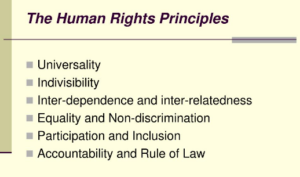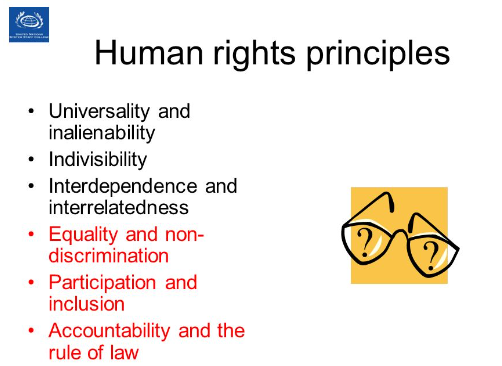|
Getting your Trinity Audio player ready...
|
Human rights principles stand as the cornerstone of a just and equitable society. In today’s world, where diversity and individuality flourish, these principles serve as a guiding light. They encompass the ideals of equality, freedom, and dignity, setting the stage for a society that respects the inherent worth of every individual. This article delves into the significance of human rights principles, their evolution, and the enduring relevance they hold in our globalized world.
The Evolution of Human Rights
To comprehend the depth of human rights principles, one must first understand their evolution. Historically, human rights were often violated, as societies grappled with notions of power and control. However, a turning point came with the Universal Declaration of Human Rights (UDHR) in 1948. This pivotal moment established a universal framework for the protection of rights and freedoms. Since then, a myriad of international agreements and conventions have further refined and expanded upon these principles.
Respecting Diversity
Additionally, respecting diversity is one of the fundamental human rights principles that underpins a just society. The world is a mosaic of cultures, religions, races, and identities, and this diversity should be celebrated, not suppressed. Discrimination and prejudice based on these differences erode the very essence of human rights. Furthermore, the principle of non-discrimination is enshrined in many international human rights instruments.
Moreover, a society that embraces diversity is more likely to thrive, as it taps into a rich tapestry of perspectives and talents. Transitioning from a mindset of intolerance to one of acceptance and inclusivity is essential for safeguarding human rights in our increasingly interconnected world.
Freedom and Autonomy
To add on, human rights principles emphasize the importance of freedom and autonomy. Every individual should have the freedom to express their thoughts, beliefs, and ideas without fear of censorship or persecution. This freedom encompasses not only freedom of speech but also freedom of religion, assembly, and association. Autonomy extends to the right to make decisions about one’s own life, including choices related to one’s body, health, and personal relationships.
However, it is crucial to remember that these freedoms come with responsibilities. They must be exercised responsibly, with respect for the rights and well-being of others. Balancing personal freedom with societal obligations is the key to a harmonious coexistence.

Social and Economic Rights
Human rights principles encompass not only civil and political rights but also social and economic rights. These rights include access to education, healthcare, housing, and employment opportunities. Therefore, ensuring these rights are upheld is vital for reducing inequality and poverty worldwide.
Transitioning to a society where social and economic rights are a priority requires concerted efforts from governments, organizations, and individuals. Social safety nets, affordable healthcare, and quality education are essential building blocks of such a society. By addressing the economic disparities that persist in many parts of the world, we can move closer to realizing the full potential of human rights principles.
Empowering Vulnerable Groups
Human rights principles extend a protective umbrella over vulnerable groups such as women, children, the elderly, and minorities. Discrimination and violence against these groups continue to be pressing issues worldwide. Empowering these communities through legal protection, access to education, and economic opportunities is essential for achieving a just and equitable society.
Transitioning from a position of vulnerability to one of strength requires targeted policies and societal awareness. Governments and civil society organizations must work together to dismantle the barriers that perpetuate discrimination and violence against these groups.
The Global Challenge
Furthermore, in our globalized world, upholding human rights principles presents a unique challenge. Borders are no longer insurmountable barriers, and events in one part of the world can have far-reaching consequences. Moreover, this interconnectedness underscores the need for international cooperation to protect and promote human rights.
Transitioning from a nationalistic mindset to one of global citizenship is imperative. Multilateral agreements and organizations play a crucial role in addressing global issues such as climate change, migration, and pandemics. By recognizing our shared humanity and working together, we can better navigate the complexities of our interconnected world while upholding human rights principles.
Conclusion
In conclusion, Human rights principles are not static; they are dynamic and responsive to the evolving needs of society. They serve as a roadmap for a just and equitable world, guiding us towards a future where every individual enjoys the same rights and opportunities. Transitioning to a society that fully embraces these principles requires dedication, awareness, and collaboration at all levels. By doing so, we can ensure that human rights remain a beacon of hope for humanity, illuminating the path to a brighter and more inclusive future.

